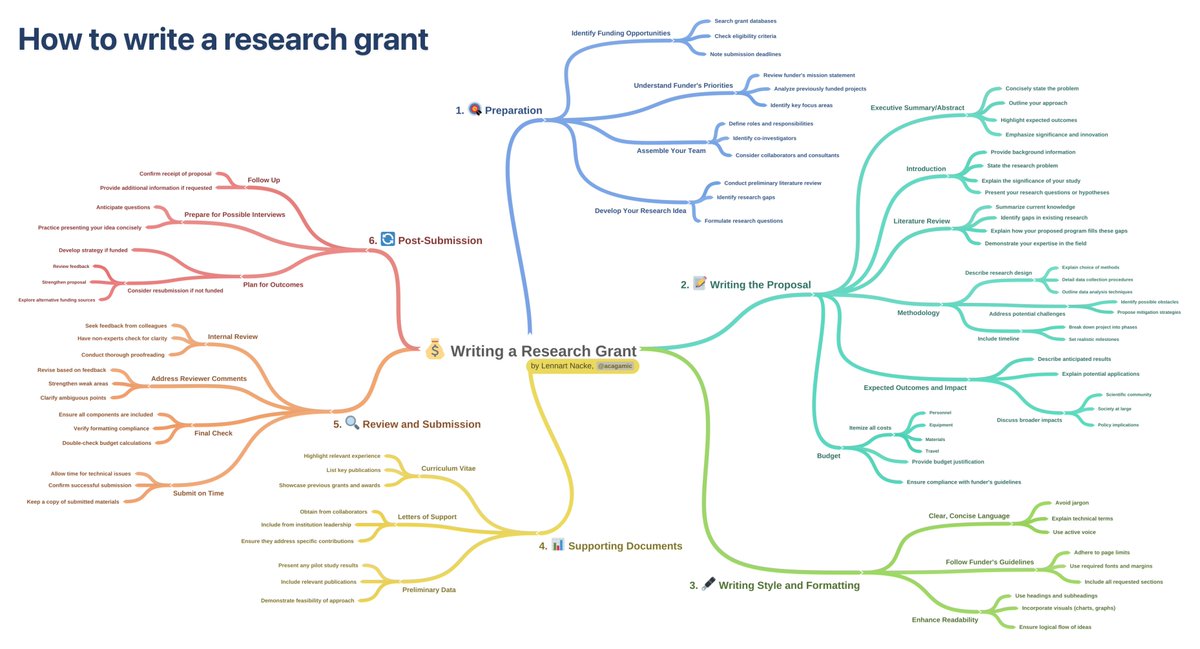Research grant writing is always evolving. (Yes, professors)
If you’re struggling with grant applications, read on...
What I'm about to share applies to all tenure-track academics. Hopefully, this guide will refine your strategy and enhance your grant success rate.
If you’re struggling with grant applications, read on...
What I'm about to share applies to all tenure-track academics. Hopefully, this guide will refine your strategy and enhance your grant success rate.

1. 🎯 Preparation
• Identify funding opportunities
↳ Databases
↳ Deadlines
↳ Eligibility
• Understand funder priorities
↳ Mission
↳ History
↳ Focus
• Develop your research idea
↳ Questions
↳ Review
↳ Gaps
• Assemble your team
↳ Roles
↳ Co-lead
↳ Collaborations
• Identify funding opportunities
↳ Databases
↳ Deadlines
↳ Eligibility
• Understand funder priorities
↳ Mission
↳ History
↳ Focus
• Develop your research idea
↳ Questions
↳ Review
↳ Gaps
• Assemble your team
↳ Roles
↳ Co-lead
↳ Collaborations
2. 📝 Writing the proposal
• Abstract
• Intro
↳ Problem
↳ Solution
• Literature Review
↳ Synthesize
• Methodology
↳ Research design
↳ Address challenges
↳ Include timeline
• Expected outcomes
↳ Results
↳ Impacts
↳ Applications
• Budget
↳ Itemize
↳ Justify
• Abstract
• Intro
↳ Problem
↳ Solution
• Literature Review
↳ Synthesize
• Methodology
↳ Research design
↳ Address challenges
↳ Include timeline
• Expected outcomes
↳ Results
↳ Impacts
↳ Applications
• Budget
↳ Itemize
↳ Justify
3. 🖋️ Writing style and formatting
• Use clear, concise prose
↳ No jargon
↳ Explain terms
↳ Use active voice
• Follow guidelines
↳ Adhere to requirements
↳ Include all sections
• Enhance readability
↳ Use headings
↳ Include visuals
↳ Ensure logical flow
• Use clear, concise prose
↳ No jargon
↳ Explain terms
↳ Use active voice
• Follow guidelines
↳ Adhere to requirements
↳ Include all sections
• Enhance readability
↳ Use headings
↳ Include visuals
↳ Ensure logical flow
4. 📊 Supporting documents
• Curriculum vitae
↳ List publications
↳ Set out grants
↳ Experience
• Letters of support
↳ Senior collaborators
↳ Cover contributions
↳ Institutional letters
• Preliminary data
↳ Pilot test results
↳ Publications
↳ Feasibility
• Curriculum vitae
↳ List publications
↳ Set out grants
↳ Experience
• Letters of support
↳ Senior collaborators
↳ Cover contributions
↳ Institutional letters
• Preliminary data
↳ Pilot test results
↳ Publications
↳ Feasibility
5. 🔍 Review and submission
• Internal Review
↳ Have non-experts review
↳ Proofread
• Address comments
↳ Strengthen weak areas
↳ Clarify points
• Final check
↳ Check budget
↳ Include all
• Submit on time
↳ Allow time for issues
↳ Confirm submission
(Keep a copy)
• Internal Review
↳ Have non-experts review
↳ Proofread
• Address comments
↳ Strengthen weak areas
↳ Clarify points
• Final check
↳ Check budget
↳ Include all
• Submit on time
↳ Allow time for issues
↳ Confirm submission
(Keep a copy)
6. 🔄 Post-submission
• Follow up
↳ Confirm receipt
↳ Provide information if needed
• (Prepare for possible interviews)
↳ Anticipate questions
↳ Practice presentation
• Plan for outcomes
↳ Develop funded strategy
↳ Consider resubmission
• Follow up
↳ Confirm receipt
↳ Provide information if needed
• (Prepare for possible interviews)
↳ Anticipate questions
↳ Practice presentation
• Plan for outcomes
↳ Develop funded strategy
↳ Consider resubmission
Happy grant writing, colleagues!
Adjust your approach and embrace the journey.
If you enjoyed this guide:
1. Follow @acagamic to get more resourceful in writing and research.
2. Share this guide with your network to support fellow researchers.
Have a great day.
Adjust your approach and embrace the journey.
If you enjoyed this guide:
1. Follow @acagamic to get more resourceful in writing and research.
2. Share this guide with your network to support fellow researchers.
Have a great day.
https://twitter.com/acagamic/status/1822543505232904498
Want more insights?
🗞️ 4,054+ people read my newsletter every week.
Join us for free:
I talk about:
• Academic success strategies
• Writing frameworks
• AI research toolsgo.lennartnacke.com/newsletter
🗞️ 4,054+ people read my newsletter every week.
Join us for free:
I talk about:
• Academic success strategies
• Writing frameworks
• AI research toolsgo.lennartnacke.com/newsletter
• • •
Missing some Tweet in this thread? You can try to
force a refresh








